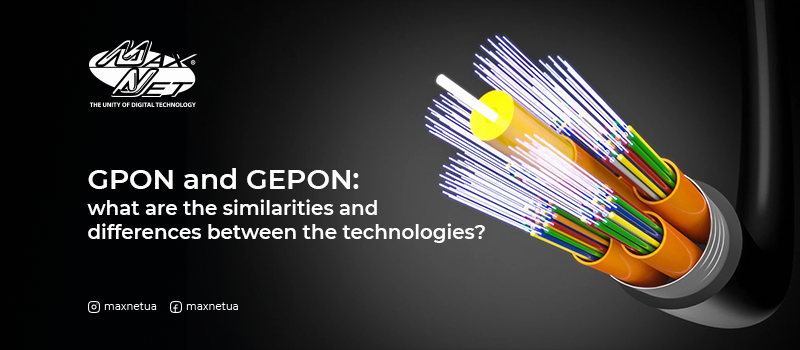
When it comes to PON technology, one may first think of its forebears APON and BPON, which are already a thing of the past. The same goes for EPON with its 100 Mbps speed, which is not always able to meet the growing needs of users.
And what about GPON and GEPON: what should a modern Internet user choose? To make it easier to decide, let's compare these data transmission technologies with each other.
GPON and GEPON: what do they have in common?
GPON (Gigabit Passive Optical Network) and GEPON (Gigabit Ethernet Passive Optical Network) are two data transmission technologies that are based on optical fibre links. Only GPON for data transmission over optical cable uses TDM (Time Division Multiplexing) — time division multiplexing, which allows transmitting several signals over one communication channel, each in its own allocated time interval. And GEPON uses Ethernet for this purpose, with the help of which data is transmitted between computers connected in a local network. GEPON technology is a bit like Ethernet, but unlike it works not through a copper cable, but through a fibre optic cable.
In general, GPON has a number of advantages. One of them is the possibility to use the existing GEPON infrastructure instead of building new communication channels. Plus signal stability, resistance to lightning, lower material cost. But at the same time, optical fibre has a noticeable disadvantage: it is more fragile, which makes working with it painstaking, because it is important not to allow bends and breaks in the cable. For this purpose, installers use special equipment.
Key differences between GPON and GEPON

GEPON and GPON are quite similar names, but in essence they are different data transmission technologies. GEPON is based on the IEEE 802.3 standard, while GPON is based on ITU-T G.984.
It is also worth paying attention to scalability: GPON supports more connected users per line than GEPON. GPON technology allows to connect up to 128 subscribers to one line, while in GEPON this number is limited to 64 subscribers per line.
Another difference between the technologies: in GEPON data packets are transmitted without much change, while in GPON this process is more complex. In addition, in GPON, information transmission is performed by ATM cells (small packets of fixed length), which are not available in GEPON.
The technologies differ from each other in other parameters as well:
- Throughput.
GEPON speed reaches 1.25 Gbps. GPON allows data transmission at a maximum speed of up to 2.5 Gbps, which does not depend on congestion, the number of active Wi-Fi, traffic volume and other factors. This technology can be compared to a high-speed motorway for the Internet, on which many cars can move simultaneously, and all of them will quickly reach their destination without collisions on the road. - Data transmission range.
GEPON uses optical cables up to 30 km long from the central node to the end user. The radius of the GPON-network reaches 20 km without the need to install signal amplifiers on the line. This ensures network stability and avoids accidents. - Subscriber network.
The structure of GEPON provides branching from 1x64 trees. GPON topology is 1x128. - Crosstalk protection.
GPON is more resistant to outside influences, because it is protected from crosstalk, which can occur when several networks work together. This increases network reliability, which makes the technology attractive for businesses, public networks, co-working spaces and other places where users congregate.
In general, today GPON technology is gaining popularity in all large cities, where many users need fast and reliable Internet. Residents of small settlements, where there is no need for high speed Internet connection, are still satisfied with GEPON. But it is only a matter of time.
Summary
In recent years, more and more ISPs are trying to gradually move away from GEPON technology and move to GPON. The latter is more convenient in terms of bandwidth and network management and offers more advantages for both the operator and the subscriber. Therefore, the transition to fibre optic Internet GPON is quite justified.
If you want to use high quality and stable Internet, which is not affected by light outages and electrical loads, the right decision is connecting to GPON now. Maxnet specialists will perform connection of services in a private house, flat or office premises upon your request.
Еще комментарии








Андрій
25.03.2024
3
0
Reply
Макснет
28.03.2024
1
0
Reply